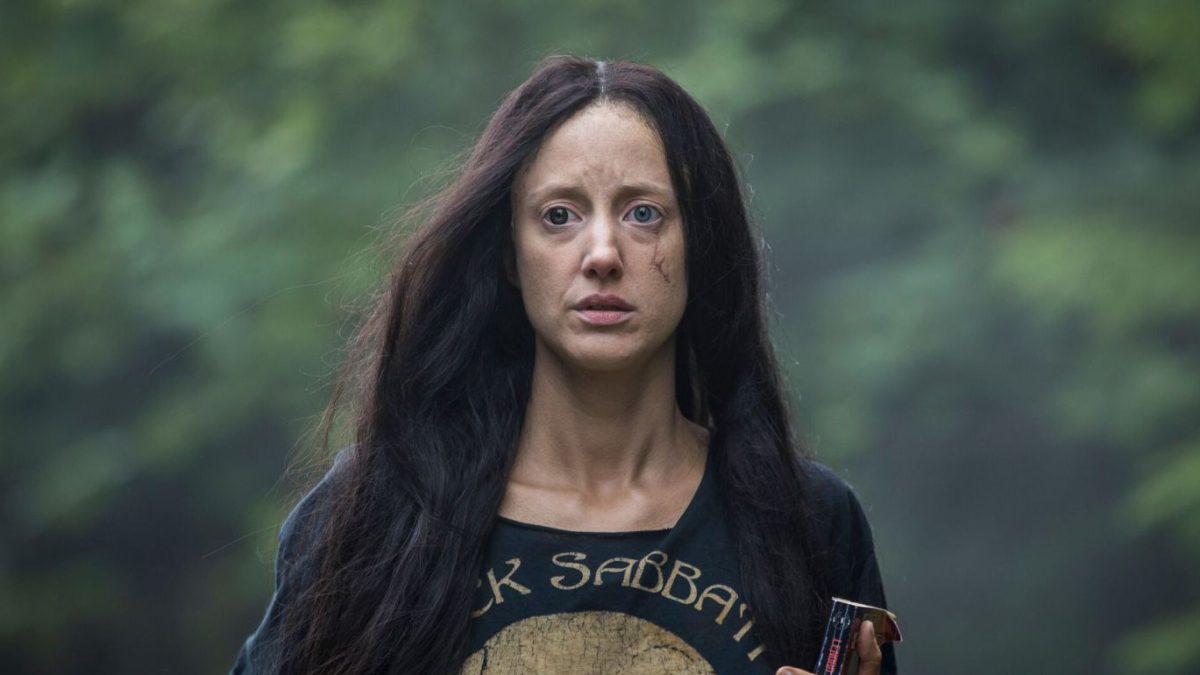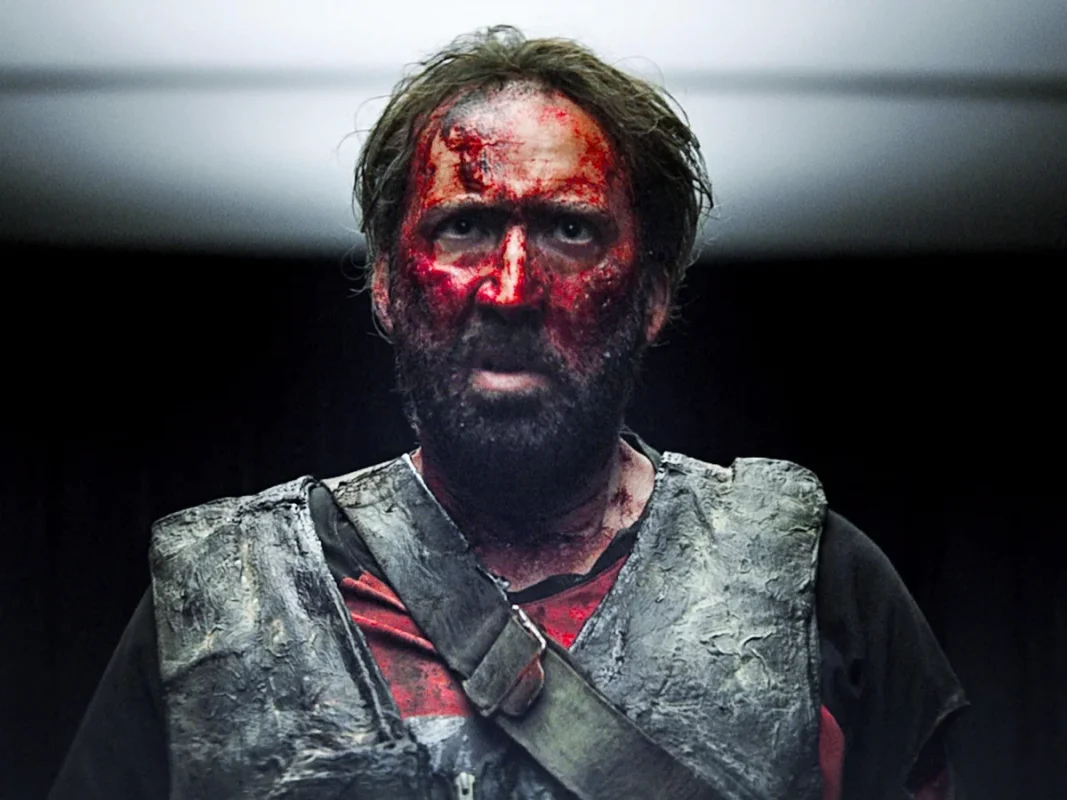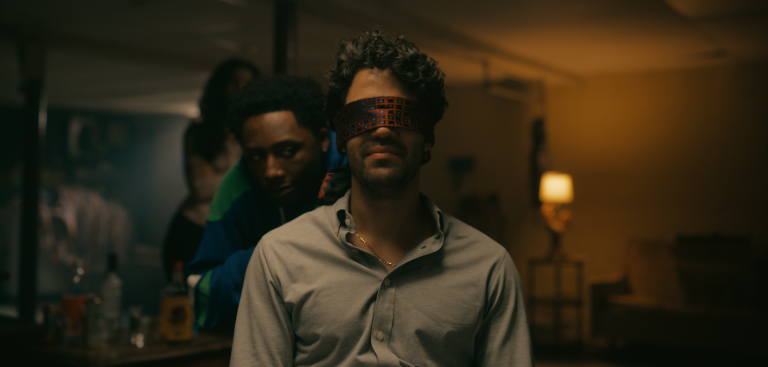Panos Cosmatos’ 2018 film “Mandy” is the ultimate midnight movie, and I remember watching it for the first time in a theater with fellow cinema goers, all perplexed by what we were seeing. “Mandy” unfolds like a flame you can’t look away from—hypnotic, dangerous, and finally, all-consuming. Panos Cosmatos doesn’t so much direct a film as conjure one from blood and smoke. I had seen his debut feature, “Beyond The Black Rainbow,” in theaters as well, but this movie is where Cosmatos really shines. It unfolds less like a narrative and more like a psychedelic ritual, dredged up from the collective subconscious and seared onto the screen until it brands itself into your memory.
At the heart of this film is Red Miller (Nicolas Cage), a man living quietly and almost anonymously in the wilderness with Mandy Bloom (Andrea Riseborough). Their relationship is portrayed with a strange tenderness. We are witnesses to quiet conversations, small gestures, and moments of stillness that feel private. There’s nothing glamorous about them, yet Cosmatos makes their love feel elemental, as if they’ve found a fragile sanctuary carved out against a world that is harsh, hostile, and uncaring.
That fragile paradise is shattered by the arrival of Jeremiah Sand (Linus Roache) and his cult, who descend on their world with the force of a nightmare. The violence they inflict is not only physical but spiritual, an annihilation of everything Red holds dear. From that point forward, the narrative of “Mandy” transforms; it stops being about love itself and becomes about the void left in its wake, a void filled by grief and rage. “Mandy” starts quietly and morphs into a bloody tale of revenge.

Cosmatos wields atmosphere like a weapon. The film doesn’t just use color, it bleeds it across the screen in waves of crimson, violet, and molten orange, images dissolving into one another like hallucinations caught in the ether. The sound design and Jóhann Jóhannsson’s monumental score throb like transmissions from another dimension, pulling the viewer deeper into a hypnotic state. The pacing is deliberately slow, often uncomfortably so, forcing us to sit inside Red’s grief before we’re allowed to see it erupt outward.
One of the highlights of the year: The 15 Best English Language Films of 2018
When the violence finally comes, it arrives swiftly but with grandeur: an axe that looks like it was forged in the fires of some forgotten underworld, a chainsaw duel so absurdly mythic it feels like legend. One of my favorite parts of this movie is the villains. They feel like they are from another planet. There is a comic book element to this movie. It could have been dreamt up by a graphic artist from the 70s who specializes in science fiction.
At the center of this madness is Nicolas Cage, giving a performance that might be one of the best distillations of his career. Cage has always been drawn to extremes, but here, those extremes feel precisely tuned to the film’s strange, overwhelming frequency. His infamous bathroom breakdown scene with Cage howling, crying, and chugging vodka is very memorable. I have mentioned before the way independent films have utilized “meme” scenes for longevity, and I would say that this scene counts. Throughout the film, Cage shifts seamlessly between devastating vulnerability and uncontainable rage, sometimes within the same breath. And sometimes it is very funny.

What makes Mandy so refreshing is its refusal to be boxed in. It’s horror, but it’s also a tragic love story. It’s a grindhouse cinema, but it feels like an arthouse film. “Mandy” is a heavy metal fantasy reimagined through the lens of exploitation cinema, where every flourish of excess carries intention. Cosmatos cares less for conventional storytelling than for conjuring a state of altered being—where grief and violence swell into myth. What makes this striking is how the characters embody that shift. The film dissolves into the hallucinatory, forcing you to inhabit the protagonist’s psyche, both through its molten imagery and its droning, feverish score. It’s a film that rewards being revisited every few years, its intensity never dimming, only deepening.
Every couple of years, revisiting “Mandy” feels different because its imagery and emotions are so open to interpretation. Sometimes it plays like a grand, cosmic revenge fable; sometimes it feels like a slow-motion dissection of relationships; sometimes it feels like a love story that has been set on fire. The characters themselves mirror this in their performance. Jeremiah Sand is both a pitiful, failed musician and a terrifying cult leader. The biker gang feels like demons summoned from another realm, yet also like desperate addicts. Red is both a man broken by loss and a figure of mythic vengeance. The film keeps you in that space between extremes, refusing to settle into one mode.
And yet, beneath the chainsaws, demons, and cosmic hallucinations, there’s always Mandy herself. Her presence lingers over every frame, even after she’s gone. She isn’t reduced to a plot device but elevated to something like a guiding spirit, the ghost of love that once was. All of Red’s fury, every ounce of blood spilled, is simply the echo of that love, distorted into something monstrous by grief. That’s what makes “Mandy” endure: it’s not just a revenge film, not just psychedelic horror, but a love story told through fire, smoke, and blood. The quiet, intimate moments from the beginning of the film reverberate throughout the chaos that follows. Even in Red’s most violent rampages, there are echoes of her. She becomes less a character in the traditional sense and more of a myth, the embodiment of love.



![Silence [2016] : A Flawed Masterpiece](https://79468c92.delivery.rocketcdn.me/wp-content/uploads/2017/02/Andrew-Garfield-Silence-movie-768x249.jpg)
![The Girl and The Gun [2020]: ‘NYAFF’ Review – A Symbolic Eye-Opener on Exercising The Presumed Power of a Patriarchal Society](https://79468c92.delivery.rocketcdn.me/wp-content/uploads/2020/09/THE-GIRL-AND-THE-GUN-Movie-Review-highonfilms-1-768x326.jpg)
![Tehran Taboo Review [2018]: A Gripping Portrait of Life in Contemporary Iran](https://79468c92.delivery.rocketcdn.me/wp-content/uploads/2018/08/tehran-taboo-1-768x322.jpg)
![Three Headed Beast [2022]: ‘Tribeca’ Review – A Quiet And Sensual Examination Of Open Relationships](https://79468c92.delivery.rocketcdn.me/wp-content/uploads/2022/06/THREE-HEADED-BEAST-768x432.png)
![Western [2018] – A Quietly Powerful Tale of Cross-Cultural Connection and Male Ego](https://79468c92.delivery.rocketcdn.me/wp-content/uploads/2019/02/Western-2018-768x416.jpg)